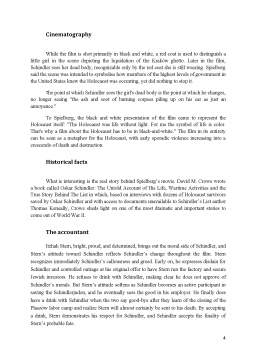Cuprins
- Introduction 2
- Schindler’s List-a move overview and the Historical Facts 2
- The plot 3
- Cinematography 4
- Historical facts 4
- The accountant 4
- Theme 5
- Bibliography 8
Extras din referat
Introduction
The reason why we chose Schindler’s List was to show that, despite of the job nature (in this case its purpose is to make profit and get riched), we can use our professional skills to decide the destinies of human beings in a positive way.
The movie depicts a different kind of accountant. While in most Hollywood production, accountants are being seen as money men driven by greed or action men trying to expose the corruption, the Schindler’s List shows this character in a very different situation, in a world where money doesn’t make any difference and where their only fear is for their life. Stern is driven not by greed but by love for his people, he is trying the whole movie to do the right thing and to save as many as he can. Although he understands that money for bribe is needed in order to facilitate the deals with SS, he isn’t so preocupied to get them. Instead, he is worried for the fate of his friends so he is assuming the role of a leader for his people.
Schindler’s List-a move overview and the Historical Facts
Schindler's List is a 1993 American historical period drama, directed and co-produced by Steven Spielberg. Based on a true story, the Schindler's List stars Liam Neeson as Oskar Schindler, a German businessman in Poland who sees an opportunity to make money from the Nazis' rise to power but ends up saving 1200 jews. Along Liam Neeson stars Ralph Fiennes as Schutzstaffel (SS) officer Amon Goeth, and Ben Kingsley as Schindler's Jewish accountant Itzhak Stern. Often listed among the greatest films ever made, it was also a box office success, earning $321.2 million worldwide on a $22 million budget. It received seven Academy Awards (out of twelve nominations), including Best Picture, Best Director, Best Adapted Screenplay, and Best Original Score, as well as numerous other awards (including seven BAFTAs and three Golden Globes). In 2007, the American Film Institute ranked the film 8th on its list of the 100 best American films of all time while The Library of Congress selected it for preservation in the National Film Registry in 2004.
The plot
In 1939, the Germans move Polish Jews into the Kraków Ghetto as World War II begins.
The film explores the theme of good versus evil, using as its main protagonist a "good German", a popular characterization in American cinema.
Thus a second theme of redemption is introduced as Schindler, a disreputable schemer on the edges of respectability, becomes a father figure responsible for saving the lives of over a thousand people.
Oskar Schindler, war profiteer, womanizer, and Nazi Party member, becomes the unlikely hero and savior of about 1,100 Polish Jews during the Holocaust. He is essentially a con artist and moderately successful businessman who recognizes the potential for profit in wartime. He arrives in the city hoping to make his fortune. He starts a company to make cookware and utensils, using flattery and bribes to win military contracts, and brings in accountant and financier Itzhak Stern played by Ben Kingsley to help run the factory. By staffing his plant with Jews who've been herded into Krakow's ghetto by Nazi troops, Schindler has a dependable unpaid labor force. For Stern, a job in a war-related plant could mean survival for himself and the other Jews working for Schindler. Schindler routinely cheats on his wife and joins the Nazi Party not for ideological reasons but because it will help him make more money. Although he purchases the factory after it has been confiscated from Jewish owners and is given an apartment appropriated from wealthy Jews, Schindler feels no remorse and does not consider the origins of his good fortune. Initially he concerned only with himself and the success of his moneymaking scheme, undergoes a change that prompts him to spend his fortune to save the lives of those he once exploited. His motive is never completely clear—and indeed, the real Schindler never revealed his motivations. However, the film does suggest that at least one of his incentives was obvious: Schindler simply could not sit by and watch people he knew be sent to death. His metamorphosis from a man of indifference to one of compassion takes place gradually over a number of scenes. His respect for his Jewish accountant, Itzhak Stern, probably has a great deal to do with his transformation, as does his witnessing of the Kraków ghetto evacuation, when he sees the little girl in the red coat. However, Schindler’s motivations may also be less altruistic: it is possible that his own ego and narcissism led him to be a savior. He initially reacts angrily to the idea that his factory is a haven, but perhaps became enamored of the idea of being a hero. The needs of his ego may, in some capacity, have surpassed his material needs. The film does not propagate such a harsh stance, but Schindler’s boorish behavior makes this speculation plausible. Nevertheless, whatever the results of an analysis of Schindler’s motivations, the good effects of his choices are undeniable.
Bibliografie
1. http://mirceadumitrescu.trei.ro/listaluischindler.htm
2. http://www.gradesaver.com/schindlers-list/study-guide/themes
3. http://www.sparknotes.com/film/schindlerslist/canalysis.html
4. http://en.wikipedia.org/wiki/Schindler%27s_List
5. http://auschwitz.dk/schindlerslist.htm
6. http://www.cinemagia.ro/filme/schindlers-list-lista-lui-schindler-1085
Preview document
Conținut arhivă zip
- The Profession in the Arts.docx










